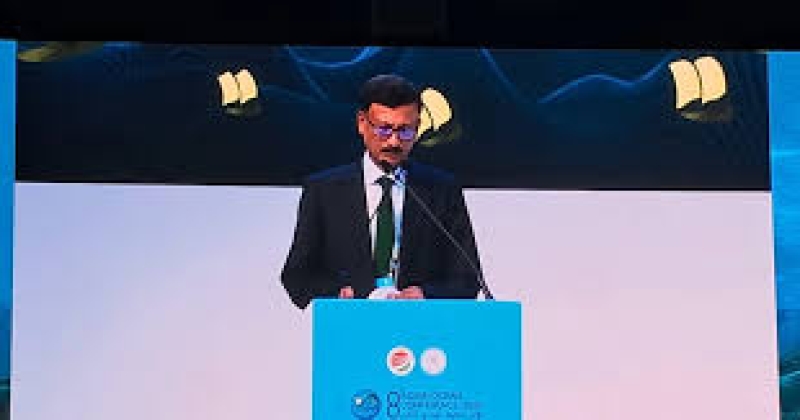- NASA Finds Ammonia Compounds on Jupiter Moon Europa |
- Remittance Inflow Surges 45% to $3.17bn in January |
- Militant Attacks Kill 33 in Balochistan; 92 Assailants Dead |
- Power generation at Payra Thermal Power Plant 1st unit starts after a month |
- Irregularities, injustice will no longer be accepted in politics: Jamaat Ameer |
Bangladesh Commits to Strengthening Indian Ocean Partnerships

Foreign Affairs Adviser Md Touhid Hossain
Bangladesh has reaffirmed its dedication to harnessing the vast opportunities presented by the Indian Ocean region by enhancing partnerships and addressing emerging challenges in the area.
“We are committed to strengthening our partnerships across the Indian Ocean, tackling challenges, and seizing the opportunities this region offers,” stated Foreign Affairs Adviser Md Touhid Hossain on Monday.
Hossain emphasized that the region’s complex challenges, along with geo-economic and geo-strategic factors, necessitate increased cooperation among nations. His comments came during the plenary session titled "Strengthening Maritime Supply Chains: Overcoming Disruptions and Enhancing Resilience" at the 8th Indian Ocean Conference (IOC) 2025 in Muscat, Oman. The session was chaired by Sheikh Humaid Al Maani, Head of the Diplomatic Academy at Oman’s Ministry of Foreign Affairs.
Highlighting the region's strategic importance, Hossain explained that the Indian Ocean connects the Asia-Pacific and African regions and has profound economic, political, and security implications.
“The conference serves as a platform for constructive discussions, idea exchanges, and forging meaningful partnerships for future collaboration across the region,” he added. “We look forward to working together to ensure a prosperous and sustainable future for all nations around the Indian Ocean and beyond.”
As a coastal state with deep historical, cultural, and economic ties to the Indian Ocean, Bangladesh has long been central to maritime activities. The nation actively participates in regional organizations such as the Indian Ocean Rim Association and the International Seabed Authority, emphasizing the importance of maritime cooperation.
The theme of this year’s conference, “Voyage of New Horizons of Maritime Partnership,” encapsulates Bangladesh’s commitment to advancing maritime cooperation to ensure collective prosperity and sustainable development in the region.
“Bangladesh places great importance on maritime cooperation, particularly in facilitating the efficient movement of goods, services, and people. This is vital for advancing food and energy security, water cooperation, disaster risk reduction, and ensuring fair access to global public goods,” Hossain remarked, stressing Bangladesh's advocacy for “shared prosperity” through “shared responsibility.”
Noting the vital role of maritime transport in global trade, Hossain pointed out that 80% of global trade by volume and over 70% by value are transported by sea. The Indian Ocean, the world’s third-largest body of water, plays a central role in this trade. Its strategic chokepoints are crucial for global oil and goods transport, with approximately 80% of the world’s seaborne oil trade passing through the region.
“Countries rely on the Indian Ocean for the movement of goods and to safeguard their economic and energy interests. However, the sector faces multifaceted challenges that threaten the efficiency, resilience, and sustainability of maritime supply chains,” he warned.
Among the key challenges are port congestion, capacity limitations, regulatory hurdles, cyberattacks, piracy, and geopolitical tensions—all of which can disrupt maritime supply chains.
“The oceans are not only a driving force for economic growth but are also vital to food security. With the growing pressures of population growth, rising food demand, water scarcity, and environmental threats, we must tackle maritime security risks such as piracy, illegal fishing, and human trafficking,” Hossain said.
He further emphasized that the global economy, food security, and energy supplies are increasingly at risk due to vulnerabilities at key maritime routes, underscoring the urgent need to strengthen maritime supply chains and overcome disruptions.
“To improve global trade, reduce costs, and ensure the smooth flow of goods, we must enhance resilience in maritime supply chains. This requires a holistic approach, incorporating technology, infrastructure improvements, risk management, and cross-border collaboration,” he suggested.
Hossain also called for the liberalization of visa regimes for seafarers, highlighting their crucial role in maintaining the integrity of the maritime supply chain.
The Indian Ocean has historically been a hub of cooperation, and Hossain believes that the benefits of multilateral collaboration will continue to grow. “To build a resilient and prosperous future, countries in the region must work together in all areas of maritime cooperation,” he concluded.
He emphasized the importance of mutual trust, respect, and the shared goal of ensuring sustainable development in the region. “We must prioritize the conservation and sustainable use of ocean resources to protect the health of oceanic and coastal environments,” Hossain said, advocating for the responsible management of marine resources for future generations.

